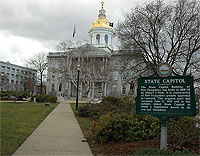GOP to dominate most state legislatures
Among the more dismal losses in Tuesday’s results was the one in New Hampshire, where Republicans won a veto-proof majority in both the state House and Senate. That means that, while Democratic Governor John Lynch retained his seat—and the position to veto any of the legislature’s pending bills to repeal the state’s marriage equality law—there are enough votes now in both chambers to overturn that veto.
It gets worse.
Republicans took over the majorities in both chambers of the state legislatures in Wisconsin, North Carolina, and Alabama—states which had both houses dominated by Democrats going into Tuesday’s votes.
In Indiana, Ohio, and Pennsylvania, where only one chamber had a Republican majority, now both are dominated by Republicans. The Maine Senate, too, has switched from a Democratic to Republican majority, with Republicans holding a hefty 21 to 13 margin that would not likely approve a new marriage equality law. The Democratic-led Maine Senate passed such a bill in 2009 by a 20 to 15 margin but the law was overturned by voter referendum later that year.
And the National Conference of State Legislatures reports that the Minnesota Senate will now, for the first time in history, be controlled by Republicans.
In all 25 state legislatures are now completely dominated by Republicans, 16 by Democrats, four are divided between the parties. The majorities in four states are still undetermined and Nebraska’s has only a non-partisan.
“It was worse than I thought,” said openly gay State Rep. Jim Splaine in New Hampshire. According to the NCSL, the state’s 400-seat House will next year be comprised of 296 Republicans and 104 Democrats. Its 24-seat senate will include 19 Republicans and five Democrats. Both easily exceed the two-thirds needed to overturn a veto.
The domination of Republicans in the legislatures is likely to mean a much more Republican Congress for the next ten years, as state legislatures in most states approve the lines for Congressional districts. Redistricting for those districts begins next year.



Leave a Reply